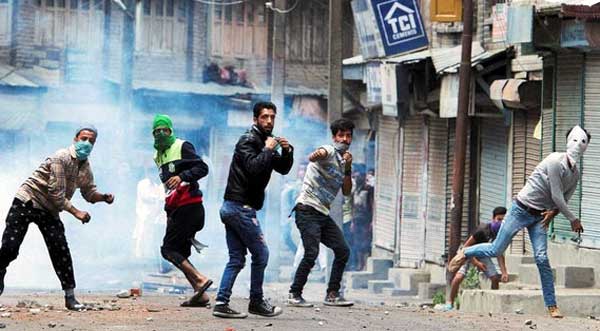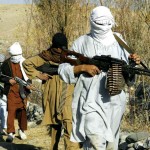IDR Blog
Warning bells in Kashmir: Politicians must reach out to the youth
The Indian media is agog with the viral video depicting a group of paramilitary CRPF personnel returning from polling duty being heckled, manhandled and abused by a few Kashmiri youths in Budgam area of Srinagar parliamentary constituency that saw a by-poll on April 4.
While the media is full of praise for the restraint shown by the troopers, it is also equally critical of the youths involved in heckling. Whether the media’s action adds fuel to the fire and demands constraint is a subject for a separate article, the issue at hand, however, is as to how the youths dared to behave like this with the men on bona-fide national duty?
The security forces are the nation’s sword arm in disturbed areas. They are deployed there to safeguard the local population, government property and national assets. They are mandated to ensure the nation’s sovereignty in these areas. It is also their responsibility to ensure that the nation’s writ runs in these areas and no one dares to take law in their own hands.
If this be so, the security forces deployed in these areas need to create an awe based on their behaviour and appearance so that no one dares to challenge their authority. There is no denying the fact that Pakistan is the sponsor and financer of the turmoil in Kashmir. But is it fair to always blame Pakistan and put the matter to rest? Certainly not. A certain amount of introspection and internal audit is needed to set our house in order.
The Budgam incident no doubt is condemnable but are only the youths to be blamed for that? It was the lack of awe of the security forces that emboldened the youths who dared to behave in the manner they did.
A critical viewing of the video would reveal the total absence of combat discipline. It was astonishing to see the way the CRPF personnel were moving through a hostile area in an unorganised manner. Their carriage of loads and personal weapons was unprofessional, to say the least. It is a complete failure of junior leadership and the CRPF hierarchy needs to take a serious note of it. If domestic loads were to be man-carried — which in fact should have been carried in vehicles, the men should have been organised in two parties namely the load-carrying party and an escort party.
Absence of proper escort party was a sure-shot recipe for inviting disaster because there was no one ready to react should someone act against them. The readers can imagine the extent of damage that would have been caused had terrorists used the opportunity to open fire after mingling with the crowd.
The commanders up the chain have to train the personnel of Central Armed Police Forces (CAPF) and instil confidence in them to shed the behaviour of a law-enforcing policeman and behave like a combatant while operating in a combat zone albeit even temporarily.
A combatant distinguishes himself with a smart turnout, perfect bearing, neat appearance, an alert eye and, above all, knowledge and application of minor tactics. Carriage of personal weapon in a manner that it can be used instantly if needed is equally important. All these clubbed together form the essential ingredients of combat discipline which needs to be imbibed by every combatant while operating in a hostile environment.
Any laxity would lead to what was seen in the video. It won’t be wrong to summarise that it was lack of combat discipline that emboldened the youths to come in physical contact with the men on duty.
It would be unfair to assume that only the Central Reserve Police Force (CRPF) is being targeted. The stone-pelters have not spared Army personnel as well. Stone throwing to enable terrorists break the cordon or while the troops are busy in conduct of anti-terrorist operations has become a common phenomenon. A few days earlier, a video showing an attack on an army vehicle by the stone pelters had also gone viral.
Another reason that has emboldened the Kashmiri youth is the judicial overreach and unwanted interference of the self-proclaimed human rights activists and arm-chair peaceniks who take pleasure in issuing sermons from their air-conditioned habitats.
The security forces are being denied the freedom to operate leading to lowering of the morale of rank and file. It defies all logic when stone-pelting law breakers are labelled as “innocent civilians” and the men in uniform are given sermon to exercise restraint.
The Supreme Court verdict of July 8 last year giving police the liberty to probe the role of the security forces involved in an encounter even in areas under the Armed Forces (Special Powers) Acts (AFSPA) has severely curtailed their freedom to operate. In “irregular warfare” at times irregular means need to be adopted to produce results which can never be achieved by “going by the book” always.
As it is, the freedom of operation of army units and sub-units had been severely eroded by the issuance of a ‘List of Dos and Don’ts’ by the Supreme Court in 1997 that are legally binding. The Supreme Court’s decision to intervene in the matter of weapon selection while dealing with stone pelters has also emboldened them while at the same time causing a serious setback to the operational decision-making capability of the security forces.
The unnecessary hysteria created by a section of the media against the use of pellet guns has also added to the confusion. The pellet gun is a non-lethal weapon and used the world over for mob control. The demand for removal or dilution of AFSPA is also unjustified at this juncture. The security forces do require a legal framework and guarantee to enable them operate freely in the disturbed areas. In fact, a similar legislation for the CAPFs operating in the combat zone is also needed.
Last but not the least is the indoctrination and radicalisation of the youth. The Kashmiri youth is confused between politics and religion. Feeling let down and cheated by the politicians of all hues, the youth is seeking solace in religion. The narrative in Kashmir has shifted from “Azadi” to “Nizam-e-Mustafa”.
In a video released by Hizbul Mujahideen, terrorist commander Zakir Musa has exhorted the Kashmiri youth “to dismiss idea of nationalism and democracy and turn towards Islam”. The youth are being indoctrinated with Wahhabi ideology by fanatic mullahs and the freely available Salafi literature on the social media. They are taught that it is the duty of Muslims to capture power and impose Sharia over the entire Jammu & Kashmir, starting with the Valley.
Sharia disapproves the concept of democracy (equality for all) because, as per Wahhabi ideology, there cannot be equality between a man and a woman, a believer and non-believer (kafir), master and a slave, a ruler and subject. It also legalises use of force (armed jihad) as means for establishment of a Caliph since the concept of a nation-state is unholy.
It, to some extent, may answer the question of poor voter turnout in the recently held parliamentary by-election. Unfortunately, we are trying to brush under the carpet this bitter and harsh reality and refusing to acknowledge the presence of the elephant in the room. Remember, the youth form 65 per cent of our population.
Undoubtedly, the Kashmiri youth is emboldened but at the same time he is disillusioned. He is seeking direction. He wants to be part of the national mainstream. He has to be freed from the clutches of fanatics and extremist ideology through correct portrayal of true Islam. He has been indoctrinated with the violent philosophy of Islam while, really speaking, Islam is a religion of peace as well.
According to many Muslim scholars, Salm & Salam are the root words in Arabic for “Islam” which means peace and tranquillity. Islam does not preach hatred but warns against “following the footsteps of Satan; for he is to you a clear enemy”.
Warning bells for the last and final time have been sounded for the mainstream politicians. If they do not shake themselves out of their deep slumber now and move out into the field to interact with the youth, they would lose whatever space is left for them in the complex matrix of power politics in the Valley.
Even civil society is expected to play a major role in restoring normalcy. A quick-fix solution is needed from the government to curb misuse of social media for promoting unrest. Hawala channels need to be plugged. The media has to show restraint so that its prime time shows do not add fuel to the fire.
The valley needs to resonate with the patriotic lines of Allama Iqbal: “Mazhab nahin sikhata, aapas mein bair rakhna; Hindi hain hum, watan hai Hindustan hamara. (Religion does not teach us to be enemies with each other: We are Indians, our homeland is our India.)”





